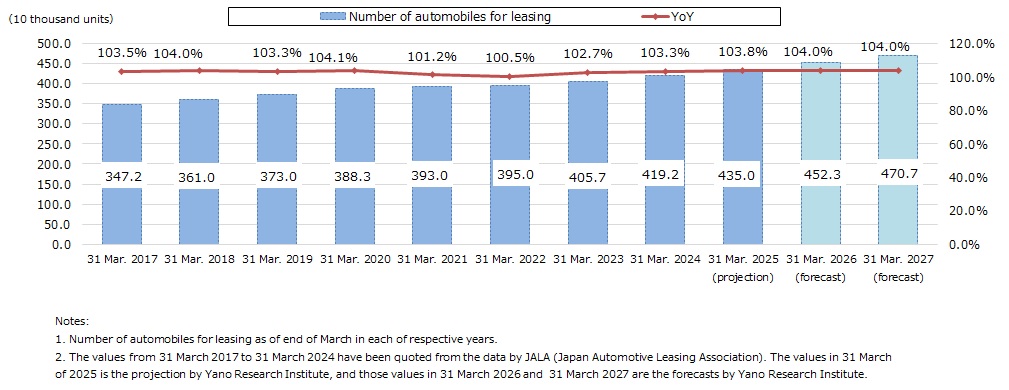No.3703
Automotive Leasing Market in Japan: Key Research Findings 2024
Number of Vehicles Secured for Automotive Leasing Projected to Increase for End of March 2025
Yano Research Institute (the President, Takashi Mizukoshi) carried out a survey on the domestic automotive leasing market, and found out the current market status, the trend of market players, and the future perspectives.

Market Overview
According to Japan Automotive Leasing Association, the number of vehicles for automotive leasing as of end of March 2024 increased from the corresponding period of the preceding year.
Corporative demand, which was affected by the spread of work from home and sluggish supply by automakers after breakout of COVID-19 crisis, turned for the better as socio-economic activities went back to normal. The number of vehicles for automotive leasing for companies at the end of March 2024 recovered to the level subtly exceeding those of pre-pandemic years.
Meanwhile, personal demand has been growing steadily. Boosted by the introduction of new services and entrance of new market players, attention on automotive leasing is rising.
Noteworthy Topics
Promoting A Shift to HEV & Building Expertise for Provision of BEVs for Achieving Decarbonized Society
In line with the Japanese government's policy to achieve carbon neutrality by 2050, domestic automakers are moving forward with electrification. Their goal is to achieve 100% electric vehicles in new passenger car sales by 2035 and 100% electric or decarbonized fuel vehicles in new light commercial vehicle sales by 2040.
In this context, the auto leasing industry has been increasing the number of electric vehicles in its fleet, with further growth expected in the future. While hybrid electric vehicles (HEVs) produced by Japanese automakers are recognized for their fuel efficiency and are leading the industry, the current market environment for battery electric vehicles (BEVs) and other factors suggest that the most feasible option for the domestic auto leasing business in the coming years is to focus on replacing gasoline-powered vehicles with hybrid electric vehicles (HEVs).
In the mid- to long-term, the adoption of battery electric vehicles (BEVs) remains a key strategy for achieving a decarbonized society. Major companies and municipalities with strong environmental awareness are increasingly interested in introducing BEVs. However, many have either abandoned or only partially introduced BEVs, primarily due to factors such as high vehicle costs, limited model options from domestic automakers, concerns about the resale value of used vehicles, and the state of charging infrastructure. Despite these challenges, we believe it is crucial for automotive leasing companies to begin offering BEVs and to build the associated expertise in preparation for the anticipated surge in demand for the shift from internal combustion engine (ICE) vehicles to BEVs.
Future Outlook
The number of vehicles secured for automotive leasing projected for end of March 2025 is projected to reach 4.35 million (103.8% of the corresponding period of the preceding year).
In leasing to corporate customers, the replacement of vehicles is progressing as the shortage of new fleet due to the supply chain disruptions that had persisted since the COVID-19 crisis has been resolved. However, some vehicle types are still experiencing delays due to prolonged delivery times. Given the circumstances, we expect the number of lease vehicles for corporate customers to remain flat or slightly increase.
Meanwhile, businesses are expanding their vehicle offerings and subscription services for individuals, while competition intensifies, as evidenced by the increased focus on face-to-face sales activities. Car leasing for individuals is expected to continue strong sales at the current growth rate.
Moving forward, we anticipate growth in acquiring new corporate customers, particularly in regional areas, as well as continued expansion in leasing to individuals.
Research Outline
2.Research Object: Leading automotive leasing companies and automotive maintenance companies
3.Research Methogology: Face-to-face interviews (including online) by our expert researchers, survey via telephone and email, and mailed questionnaire
What is Automotive Leasing?
Automotive leasing is a contract that allows users to lease a vehicle of their choice through a leasing company, which purchases the vehicle on their behalf. This model has primarily grown among corporate clients, who benefit from advantages in several areas: accounting, where it reduces initial costs and levels out capital investment; finance, by enabling more efficient fund management and access to secured borrowing limits from financial institutions; and operations, by minimizing the need for in-house vehicle management. Today, the vehicle leasing market is expanding beyond corporations to include individual consumers, including small business owners.
For the numbers of automobiles secured for leasing, the values from 31 March 2017 to 31 March 2024 have been quoted from the data by JALA (Japan Automotive Leasing Association). The value for 31 March of 2025 is the projection, and the values for 2026 and 2027 are the forecasts by Yano Research Institute.
Published Report
Contact Us
The copyright and all other rights pertaining to this report belong to Yano Research Institute.
Please contact our PR team when quoting the report contents for the purpose other than media coverage.
Depending on the purpose of using our report, we may ask you to present your sentences for confirmation beforehand.